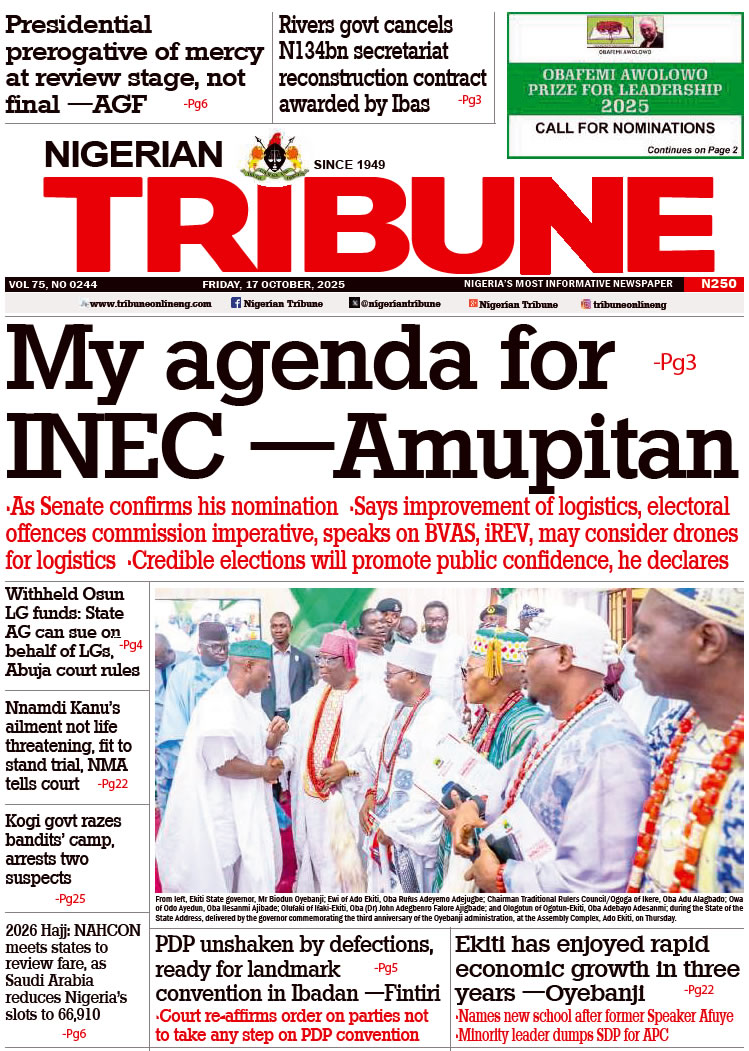Òsárétín Òsádébàmwén examines the controversy surrounding the Water Bill and why some Nigerians are against its being passed by the National Assembly.
Fourteen clearly defined principles would guide the implementation of the controversial water bill, when passed by the National Assembly. These are encapsulated in the opening section of the five-chapter-bill, which hs 154 sections. It also closes with the explanatory memorandum which states
that: “This Bill seeks to establish a Regulatory framework for Trans Boundary Water Resources in Nigeria, provide for the equitable and sustainable development, management, use and conservation of Nigeria’s Inter-State surface Water and Groundwater Resources.”
Section one of the bill demands the federal government with the responsibility, to ensure that the rights of Nigerians irrespective of their religious, regional political or ethnic leaning, have unfettered access to water for their domestic use. The principles that guarantee these rights are captured under the “objective and entitlement to use of water” section “1.-(1)” of the bill it stated thus:
“The objective of this Bill is to ensure that the nation’s interstate water resources are protected, used, developed, conserved, managed and controlled in ways which take into account amongst other factors: (a) citizens’ right of access to safe water and basic sanitation; (b) meeting the basic human needs of present and future generations; (c) promoting equitable and affordable access to water and reducing poverty.
It further stated that the federal government would also ensure that “adopting hydrological boundaries as the basic units for water resources management; protecting the water environment for sustainability of the resources and protection of aquatic ecosystems, and recognizing the polluter pays principle; providing for existing customary uses of water and avoidance of harm to other water users; promoting the efficient, sustainable and beneficial use of water in the public interest.
Other consideration by the proposed bill for water usage are: “facilitating social development, improved public health and economic development; supporting initiatives to reduce and prevent pollution and degradation of water resources and the aquatic environment; managing floods, desertification, droughts, erosion control and land drainage and supporting other environmental measures aimed at promoting climate resilience, climate risk mitigation and adaptation.”
It further championed “encouraging comprehensive and equitable coverage of water supply and sanitation including promoting public-private sector partnerships in delivery of water services; promoting public-private partnerships in the development and management of water resources infrastructure; promoting dams’ safety and appropriate reservoir operation and management; meeting international obligations and recognizing and implementing the principle of water as an economic good and social good, taking into consideration the socio-economic status of the users, particularly affordability.”
In spite of this itemized commitment to use the legal framework to harness the water resources and assets for the wellbeing of the nation’s population with regards to her population’s health and the environment, the bill has attracted more vociferous voices demanding it be thrown out of the Red and Green chambers of the national legislative house and warehoused in the trash bin of history.
The grouse by those kicking against the bill is that it seeks to commercialize the use of water in Nigeria. This, in their view, runs contrary to goal six of the sustainable development goal which champions the “availability and sustainable management of water and sanitation for all.” While for the ministry of water resources. The bill encapsulates all that would facilitate goal six of the SDGs. This contrasting view demands clarity from the protagonist in the raging national discourse on the bill, the Ministry of water resources and her team of experts.
The campaign against the bill, according to the Minister of Water Resources, Engr. Suleiman Adamu, was largely drawn from deliberate mischief of some members of the public, whose vested commercial interest would be interrupted by the legal framework proposed by the bill and its subsequent implementation when passed. It would not be business as usual, for these sets of water merchants. By the new legal regime, they would be expected to make payments for licenses on the water they trade on, besides, their activities, especially on unscrupulous access to groundwater which remained the core of water asset to any nation, would be guided to ensure they do not serve members of the public contaminated water in the guise of doing water business. The bill would promote public safety in human and animal health as well as that of the environment. Such a regulatory framework, the unscrupulous businessmen detaste. These among others have woven the hate around the bill and its good intent for the Nigerian population and its environment.
The Minister argued further that many Nigerians have not acquainted themselves with the bill. The negative narrative against the bill has been fuelled more by this ignorance of its opposition. He charged Nigerians to dig deep into the provisions of the bill and see the laudable work the 13th version of the bill has become, after going through the furnace of experts in the water sector.
He argued that the bill would ignite responsibility of the national, sub-national government and the private sector for improved water delivery.
To buttress his view of the poor water delivery system which he believed would be improved by the bill, Suleiman said: “There’s not a single city in this country that enjoys pipe borne water 24 hours, seven days a week. I challenge anybody to tell me which one city has that? There is none!” He stated at a media debrief on the importance of the bill to Nigeria water asset. “The effort we are making to improve that is that we have subscribed to the Sustainable Development Goal (SDGs) that all land issues will be in accordance with the Land Use Act.
“That means state governors will continue to exercise their powers over land. There is nowhere in this bill, where anything is mentioned that the federal government will take responsibility for any land. Not even one square inch or one square millimeter or one square micro millimeter. Nothing whatsoever,” Suleiman said.
“So please tell the citizens the truth about this bill. People are trying to mislead Nigerians for whatever interest but we know that some of them have been sending this false narrative since this issue started. And for them to maintain their credibility they have to continue to spew these lies to the world.
‘’So that they can remain relevant because once the truth is out, they would have lost the credibility or integrity they pretend to have. Others are doing it because they are taking water in commercial quantities. Mining water and selling to poor people even when they had the opportunity to improve the water services in their own locations.
“And they don’t want to pay the necessary licensing fees. And let me tell you based on the delegated powers of the minister, today, the National Integrated Water Resources Management Commission (NIWRMC) has even the right to seal a premises.
“The laws are there. For some people, because of their vested interest, they are sponsoring attacks against the bill. They do not want to go and subject themselves to licensing and therefore they are attacking and desperate at discrediting the bill for their own personal interest.”
The minister also noted that “Others are simply ignorant and do not want to read and do not want to understand it. They have taken a position that they don’t want to understand because, as far as they are concerned, anything that this administration is doing, must be opposed or rejected.
“But at the end of the day, it is not President Muhammadu Buhari you’re hurting. You are not hurting Engr. Suleiman Adamu, or the Directors of the ministry, You’re hurting the Nigerian people. You are dragging the nation back because the bill is good for the country.
‘’This bill, if passed into law, will be the basis for improving the water resources of this country and water resources service delivery nationwide.
Arguing further on the merit of the bill to transform the water sector of Nigeria, the Executive Director, National Integrated Water Resources Management, Mr Bashir Magashi, stated that the bills’ provision in management of the Trans boundary water was not different from the federal government’s exclusive control of the Nigerian Airspace; federal road network that traverses the length and breath of the country through various states and even passing through local governments. yet , this management of the federal roads across Nigeria does not hinder the use of the same by the people of the state or its government.
He said these networks of transboundary routes in the air and the land have not caused any sort of conflict between the federal and state government. Therefore, that of the water would not be different, especially where the resource would be managed on behalf of Nigerians.
Magashi, who reinforced the Minister’s view that Nigerians should avail themselves of the opportunity to participate in the public hearing of the National Assembly on the bill, surmised that the knowledge on the import of the was critical to boosting the preservation of the water asset of the country for clean and hygienic water supply and consumption, nationwide.
ALSO READ FROM NIGERIAN TRIBUNE
WATCH TOP VIDEOS FROM NIGERIAN TRIBUNE TV
- Relationship Hangout: Public vs Private Proposals – Which Truly Wins in Love?
- “No” Is a Complete Sentence: Why You Should Stop Feeling Guilty
- Relationship Hangout: Friendship Talk 2025 – How to Be a Good Friend & Big Questions on Friendship
- Police Overpower Armed Robbers in Ibadan After Fierce Struggle







